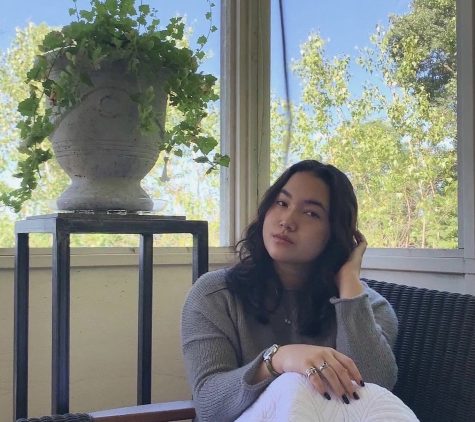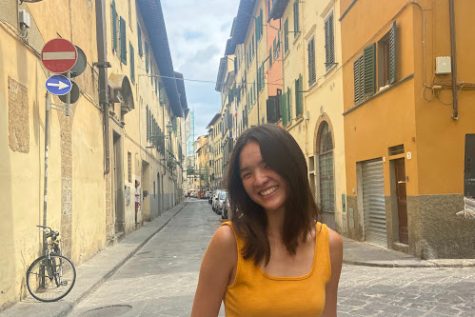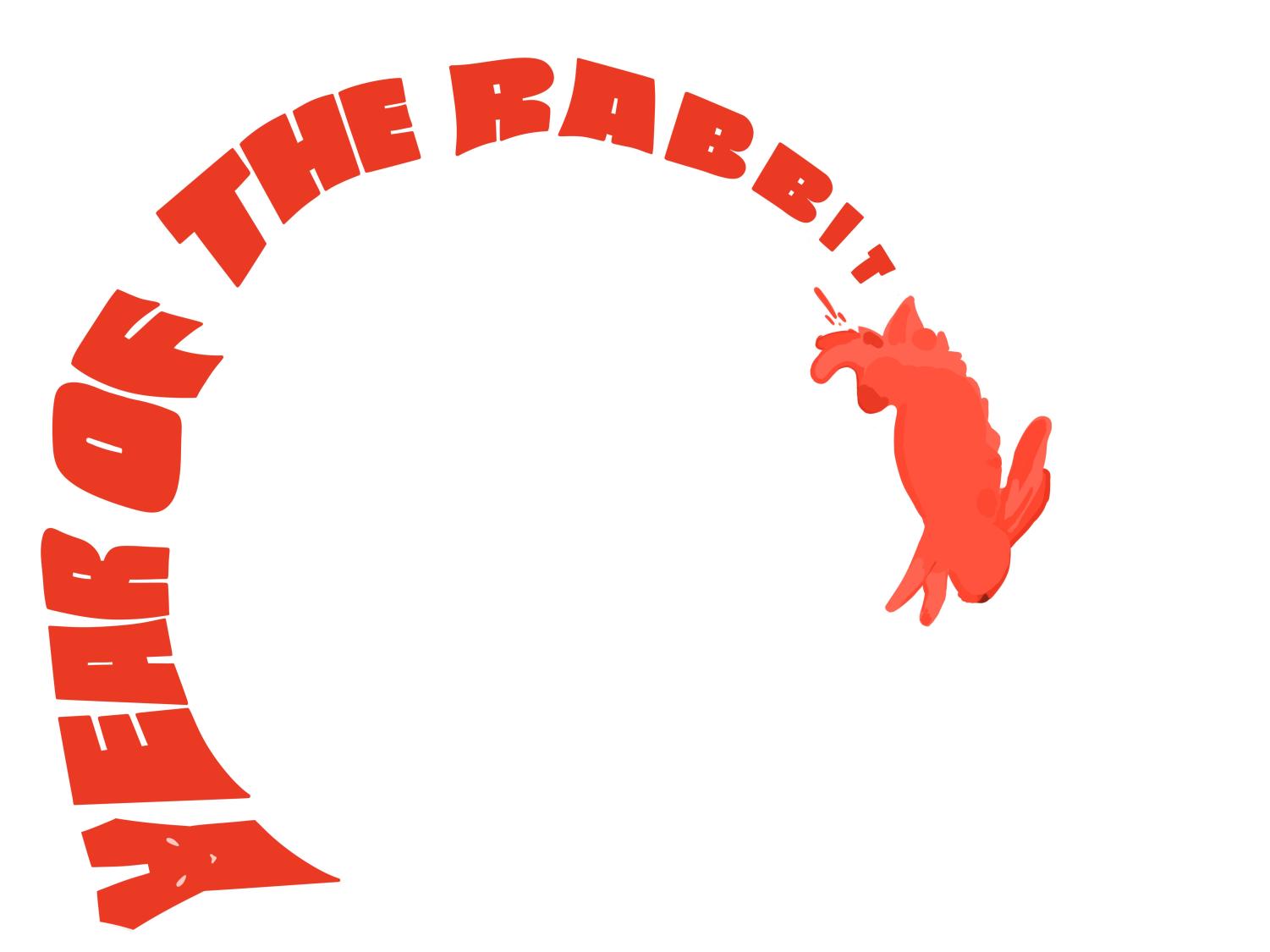



Lunar New Year, a notoriously boisterous celebration in East Asia, has once again come and gone quietly at CHS. This momentous event is rooted in centuries of history and centered around ushering in a new year of good fortune. Asian American students and staff share their unique traditions and the importance of holding on to them, as well as their hopes for the future.
March 10, 2023
Only 3% of CHS’s student body is Asian American. The lack of cultural community for Asian American students within CHS can be isolating, especially on a significant holiday such as the Lunar New Year.
Parades filling the streets, decorations covering every surface and the smell of freshly made food wafting from every window are the social norm in East Asia. The same cannot be said for suburban American streets.
“You could see that extreme dichotomy growing up, where inside your home, it’s family and festivity, and as soon as you step outside, it’s a normal day for most Americans,” said Luciana Qu, a CHS math teacher who grew up in Ann Arbor.
It is believed that Lunar New Year originated during the Shang Dynasty (1600-1046 BC), although the exact date is unknown. According to a legend created during the Zhou Dynasty (1046-256 BC), Nian, a mythical beast, consumed livestock, crops and people, terrorizing villages. The citizens’ solution was to leave food on their doorsteps for him as an offering. It was discovered by a wise old man that Nian was afraid of the color red and loud noises, so people began hanging red lanterns and scrolls, and cracking bamboo, scaring Nian away for good. This marked a new beginning for the village, and thus, the new year. The Lunar New Year falls on the second new moon after the winter solstice occurs, which is usually between Jan. 21 and Feb. 20.
“[Lunar New Year is] a big, important event for people of my culture and being able to be a part of that and see what it’s like, and [be a part of] different traditions is really interesting,” said Oliver Maranda.
Traditional foods include whole fish for prosperity, dumplings and spring rolls for wealth, sticky rice balls for togetherness and long noodles for longevity and happiness. Dragon Dances are performed by several dancers holding poles attached to a giant dragon, which are raised and lowered to mimic movement. This ritual is believed to scare away evil spirits and attract good fortune. Another common element of Lunar New Year is red envelopes which contain money and are given to children by older family members.
“Traditions are what make up a lot of our culture and our connections and things that help us to connect with other people,” said Joslyn Hunscher-Young, a history teacher.
Several Asian American students and staff at CHS were asked how they celebrate and view Lunar New Year and the importance of holding on to tradition and culture.
How has your celebration of Lunar New Year changed since quarantine?
This year, we exchanged gifts of some sort, we had our cousin’s family come over and then we ate a big meal together. But before the pandemic, I used to go to Chinese school, and they had this event every year where each grade would perform something special. After the performances, there’d be traditional Chinese games and food. There were always those shows where the people are holding the dragon head with a pole and people dance with it. The younger kids, third or fourth graders, would do a dance or sing a song. But now, there’s the pandemic, so they don’t do it anymore. What I miss the most is being able to actually see the different kinds of cultural stuff you do, because there were a lot of pre-pandemic activities, where you could see calligraphy, and people would do it [in front of you]. I thought it was really cool. Now, I think it’s a lot less social in a sense, and it’s more family [oriented].
Why do you think it’s important to hold on to these traditions?
This culture is one of the only cultures I really do celebrate. In America, [there’s] Thanksgiving, Christmas, those kinds of holidays. But our family doesn’t really value them as much as Chinese [holidays] because they immigrated here from China. So I think if I don’t keep and hold on to [my traditions], I won’t really have a culture to celebrate and enjoy.
What hopes do you have for the new year?
My grandparents and parents think that Lunar New Year is about fortune and blessing for the next year. They wish for the well being of the whole family. I think that’s a good thought, a good thing to think about. For myself, I think mostly [about] making sure my mental [health] stays good and making sure that friendships and school stuff stays the same. For my family, I hope nobody gets sicker than they already are.
How would you explain Lunar New Year and its significance to someone who hasn’t heard of it?
Honoring your ancestors is one big part of it, and wishing luck for the next new year. People think that it’s kind of weird, some of the things we eat, or maybe some of the plays that are put on. [To them] I’d say, first give it a try and see if you like it.
How has your celebration of Lunar New Year changed since quarantine?
For me, a lot has changed. My dad, who was Chinese American, passed away in April 2020. So that meant some shifts and changes, since he had done a lot of the New Year’s celebrations. But we still celebrate. We still have a big meal with way too much food and spend time with family. Those things are the same but different with the loss of my dad and different things are starting to come back this year. The one thing on Chinese New Year was, in order for us to get our red envelopes, we had to say gong hei fat choi (happy new year in Cantonese), and so we still have to do that, and my husband still has to do that during the celebrations, and my kids still have to do that.
Why do you think it’s important to hold on to these traditions?
Traditions are what make up a lot of our culture and our connections and help us to connect with other people. And that is important. Obviously, as a history teacher, I think [traditions are] part of understanding your own history and understanding where you come from. Being able to pass on some of those things and create new things, I see as an important part of parenting. Also a part of life is helping other people around you to understand who they are, who you are, where you all come from and how that informs who you are today. There is a large Asian community in the area, but it’s not necessarily something that [my family is] consistently a part of. So seeing and recognizing [that] other people celebrate this holiday can be important too. For me, having lost my dad who was trying to use that kind of familial connection, it isn’t there and so for me, and hopefully for my kids, [continuing these traditions is] providing a way to connect with community and maybe connect them with heritage that might be somewhat lost.
What hopes do you have for the new year?
I’m hopeful that things turn out okay, and that people take the time to cherish those around them and to really connect in, and figure out, and value, and spend time with the people that are important to them. I hope, especially within the Asian American community, that people are able to hold each other close and figure out ways to continue to make our society a better place than it is.
What new traditions are you creating?
This year, I decided to share a sort of tradition with my forum. On whatever the Tuesday after New Year’s, the 25th or something of January, I brought in a bunch of dumpling filling and dumpling wrappers. We had a dumpling-making party in forum and just made a bunch of dumplings that they could then take home and cook. It was mildly entertaining to watch people that had never made a dumpling before attempt to do it for their first time, but they all grew a lot and made really solid-looking dumplings by the end. But I think that that’s something that I want to try and continue as well, because I think it’s an important way to share the culture and some model for students how they can bring it in share something about themselves too, and build those connections in forum. Plus, dumplings are delicious.
How has your celebration of Lunar New Year changed since quarantine?
My family actually resides currently in Seattle. Pre-COVID-19, my parents would always host these really big dinners and celebrations with as many families as possible. We would have about three full families under one roof and we would take pictures and really eat a lot. During COVID-19, this was kind of put off because a lot of families were scared. So it was put off for a couple years, but now it’s back to being a thing. We’re really lucky. My grandparents in the past have cooked a lot of food for us and my parents would take pictures, lots and lots of pictures, and everybody would be eating. We just played Mahjong until like, three in the morning. It was a really big deal. It was a way for the family to really spend time together.
How do you view Lunar New Year as an Asian American?
Lunar New Year is the biggest celebration for a lot of East Asians, and it’s really difficult to not have the type of celebrations that we typically see in Asia, with the dancing lions and the firecrackers. It’s really difficult because you don’t really see the impact as a culture or as a societal norm for Lunar New Year [in the US]. In China, you don’t really have to create this event. Whereas here, especially in places that don’t have a massive Asian American population, what you have to do is you have to create that kind of vibe at home, which is very secluded. Growing up, my parents tried really, really hard to make that a celebration. But you could see that extreme dichotomy growing up, where inside your home, it’s family and festivity, and as soon as you step outside, it’s a normal day for most Americans.
Why do you think it’s important to hold on to these traditions?
I think that for a part of just growing up as an Asian American, very little needs to be said — we just look different for most people and what we look like isn’t typically considered as what Americans consider as American. We just look different, and as a result the way that we perceive ourselves and the way people may have treated us growing up really affects how we see ourselves and our identities. So holding onto these traditions I feel gives us a connection to not only just our ancestors and people back home in China or anywhere else, but also gives me something to relate to people who look like me, who celebrate these things with me. It feels like a very small part of something a lot bigger, that this is something that has been happening for thousands of years and feeling like I’m part of that also makes me feel like I belong in that culture. And it’s really powerful when you come here as an immigrant, and you feel like you’re always the minority and that people don’t celebrate the same things that you do. It’s kind of like you bring a lunch box full of like Chinese food that your parents made and people are looking at you like, “What is that? Why does it smell so weird?” It’s kind of like that, but in terms of a much bigger scale. Right now, you have a celebration which means so much to millions, billions of people around the world. But it’s so unknown over here in the Western Hemisphere.
What hopes do you have for the new year?
I want to look to this year for growth. I think emotionally and familiarly I’ve been separated from my parents for about 10 years, and I really feel like family is such an important thing to continue maintaining that connection to. With Chinese New Year just passing, it really reminds us how important it is to be close to our loved ones and to find that connection to somebody who really understands what we’re going through as minorities or immigrants or people who just celebrate things a little bit differently.
How do you view the future of Lunar New Year?
I know that what happened in California earlier this year was completely devastating to the Asian American community and I know that during that time, one of the public representatives let people know that they still wanted the [new year] celebration to be taking place, [despite] the awful, devastating impact that happened. And so on one hand, it’s devastating. And on the other hand, it’s also so encouraging to see that there are people who are still trying very hard to create that kind of pocket of tradition, just to feel like they’re part of a community who see the impacts of celebrating such a large thing. It’s the diaspora of East Asian Americans and Southeast Asian Americans and it’s really powerful and encouraging to see this, just to see them really trying to persevere through this pain and continuing the traditions that they’ve been used to for the past thousand of years.
How has your celebration of Lunar New Year changed since quarantine?
[My family] always tries to go out and have some sort of long noodles to represent living a long life. We would normally go to different Korean restaurants, but for the COVID-19 years we didn’t do that much. One year we made dumplings, and that was fun. I also remember going to [the restaurant] Arirang and having japchae and bibimbap. I really like noodles, so eating long noodles is my favorite part, and just spending time with family and exploring different parts of my culture that I don’t really think about every day.
Why do you think it’s important to hold on to these traditions?
I think it’s important to connect with different parts of your culture, especially when those parts of your cultures [have] a lot of stigma and negative things happening to people like that, and just being who you are. [Lunar New Year is] a big, important event for people of my culture and being able to be a part of that and see what it’s like, and [be a part of] different traditions is really interesting. I don’t really practice that culture every day and it’s really interesting to see what it’s like, with different members of my family, and what people who are still in Korea — what they would do. I think it’s important to give each of these parts of myself the attention that they deserve, and take moments to just reset and explore different parts of my identity.
What does “new year” mean to you?
I [celebrate] all sorts of different New Years. [My family celebrates] three new years. We have the calendar new year, the Jewish new year, and then Lunar New Year, and it’s interesting because all of the symbolism and new starts, and instead of being like, “I’ll do it next year,” you have more opportunities to just make a significant change, and just make a big difference in your life. I imagine I would have different connections with both of my grandparents on my mom’s side if they were still alive. They would practice different traditions like red envelopes, and a lot of bowing. And I think it’s a little bit sad that my sister [and I] won’t ever be able to share those experiences with them. I think it’s important to share these experiences with the family members that you still have.
What do you want your relationship with the Lunar New Year to look like in the future?
I’d like to learn more in depth about the Lunar New Year because [my family does] more surface stuff, because we’re very busy and we just spend time that night, but I feel like learning more about different celebrations, or maybe [learning to] make different kinds of foods so you can also make them in the future is important. When I go live on my own, I can also continue on with these traditions. And they taste really good.
How do hardships the Asian American community faces influence your view of the Lunar New Year?
I think it’s important, and even more so during trying times, to stick together and spend time with groups and celebrate what people want to stop from happening, or attack or put down. Especially [since] COVID-19 also brought stigma against Asian American communities because they would blame them for [the pandemic] happening, and I feel it’s important to stay together, stay with family and friends.

